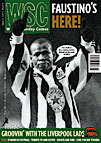 The euphoria surrounding South Africa's recent Nations Cup triumph can't disguise the problems afflicting football on the African continent, as John Sugden and Alan Tomlinson report
The euphoria surrounding South Africa's recent Nations Cup triumph can't disguise the problems afflicting football on the African continent, as John Sugden and Alan Tomlinson report
Behind the mask of success, African football is in a state of chaos. Take Cameroon, for instance, a country which came within a bad tackle of knocking England out in Italia 90. Prior to the Finals the squad had gathered at a training camp in the then Yugoslavia. According to Joseph Antoine Bell, a goalkeeper in the squad for the last two World Cup campaigns, they only had eight footballs to practice with, “and only one ball was any good . . .”. The team doctor and trainer had no medical gear and the players had to have a collection to buy bandages and other essentials.
Yet Bell knew that the Federation had already received a sizeable subvention from FIFA to help the team’s preparations. Bell, who was then a senior professional in France (and well placed to understand corruption in football), got the team to agree that they would refuse to play their first game, against Argentina, unless the federation paid them their wages in advance.
In the meantime he instigated a system of fines to ensure that players turned up on time to practices, meals and so forth. Bell’s strategy worked to the extent that at the eleventh hour the Federation came up with the wages, which might otherwise have disappeared into the pockets of Federation officials and politicians back in Yaoundé. Cameroon got far enough in the competition for the players to earn sizeable bonuses which they never received because, after the event, the threat to withdraw labour became meaningless.
Bell explained that the USA 94 endeavour was just as chaotic. The vast majority of an estimated $4 million which should have accrued to the players and been used for football development in Cameroon disappeared. The government responded by disbanding the Federation and imposing a politically-accountable regime, which its critics feel is likely to be as corrupt as the outgoing body.
FIFA’s response to this coup d’état was to suspend Cameroon until a democratically-elected Federation resumed control. It was only through the intervention of the African federation, CAF, that Cameroon were allowed to participate in this year’s African Nations Cup. If there are no significant reforms it is unlikely that they will be allowed by FIFA to participate in the qualification stages for the 1998 World Cup.
For this competition, Cameroon got their flight tickets to Johannesburg late and lost a night’s sleep over a flight delay. Thus, they had to play South Africa at altitude in the opening match less than 24 hours after arriving in the country. Not surprisingly they were hammered 3-0. A further twist was added to Cameroon’s story two days after this defeat. Much to the dismay of team manager Jules Nyongha, the former Brazilian captain, Carlos Alberto Torres, who walked out on Nigeria last year after working for eight months without being paid, arrived at the team’s hotel to be introduced as the new ‘technical advisor’. He had been flown from Brazil by MBM Multimedia Inc, the company which brokered Nike’s $7 million sponsorship of Cameroon football.
Nyongha got a stay of execution when the team managed to scrape a 2-1 victory over Egypt, but Yves Yopa, the MBM representative and Torres’ chaperon, was confident that after the tournament, Carlos Alberto will be installed as Cameroon’ new manager. Nike are eager to see a return on their investment and believe that such a world-respected figure will be good both for Cameroon football and for headlining their products. This may be the first case of an international team manager being appointed by the sponsors.
It is traditional to view big corporations such as Nike as villains in the political economy of world football. However, Yopa explains that in order to receive instalments of the $7 million sponsorship, the Cameroon Federation must adhere to a carefully-structured budget which ensures that most of the money is spent on football and related projects. In a context where, as Bell put it, “normally for every $100 which is supposed to be spent on football, $90 disappears” the intervention and financial control of the multinationals may be one of the few things which will help to save African football.
Unfortunately, Cameroon is not an exceptional case. Behind the mask of almost all other sub-Saharan nations taking part in the 1996 African Cup of Nations lurk similar stories. As Cameroon checked out of their hotel, Zaire checked in, in preparation for their group match with Liberia. Almost immediately the rumour spread that $500,000 which was earmarked for the players’ and manager’s wages and bonuses had disappeared en route between Kinshasa and Durban where, it was further rumoured, the Zairean Minister for Sport had recently purchased a summer house. (Zaire’s Turkish coach resigned and several of the players refused to play in the next game until they were paid.)
Joseph Antoine Bell believes that so long as representatives of FIFA, UEFA and CAF and related bodies, in pursuit of their sectional interests. continue to lie about the state of the domestic game, no matter how many George Weahs are exported and no matter how far individual African nations go in France ’98, the future of football in Africa will continue to be bleak.
From WSC 109 March 1996. What was happening this month